
Ethnologies
Scope & Guideline
Bridging Theory and Empirical Research
Introduction
Aims and Scopes
- Cultural Heritage Studies:
A primary focus on the documentation, preservation, and analysis of both tangible and intangible cultural heritage, emphasizing local and indigenous practices. - Ethnographic Methodologies:
Utilization of qualitative research methods, particularly ethnography, to delve into the lived experiences and narratives of various communities. - Interdisciplinary Approaches:
Encouragement of cross-disciplinary research that incorporates insights from anthropology, sociology, history, and cultural studies to enrich the understanding of cultural phenomena. - Global and Local Perspectives:
Exploration of cultural issues from both global and localized viewpoints, addressing how global trends impact local traditions and vice versa. - Political and Social Implications of Culture:
Investigation of the intersections between culture, politics, and social issues, particularly in the context of identity, governance, and community resilience.
Trending and Emerging
- Intangible Cultural Heritage:
An increasing focus on intangible cultural heritage, particularly in the context of Ukraine, showcases the journal's commitment to understanding and preserving living traditions amidst modern challenges. - Cultural Resilience and Governance:
Emerging themes around governance, cultural resilience, and community empowerment reflect a growing interest in how communities navigate social change and maintain their cultural identities. - Cultural Rights and Indigenous Struggles:
A rise in discussions surrounding cultural rights, particularly for indigenous peoples, highlights the journal's engagement with issues of recognition, representation, and sovereignty in cultural contexts. - Digital Ethnography and Virtual Communities:
The exploration of digital spaces and virtual communities indicates a trend towards understanding how technology influences cultural practices and interactions in contemporary society. - Cultural Implications of Environment and Climate Change:
A noticeable trend in research examining the relationship between cultural practices and environmental issues underscores the journal's relevance in addressing pressing global challenges.
Declining or Waning
- Traditional Folklore Studies:
There has been a noticeable decrease in works solely dedicated to traditional folklore, as the journal increasingly prioritizes contemporary cultural practices and their socio-political contexts. - Static Cultural Representations:
Research focusing on static or unchanging representations of culture is diminishing, with a growing preference for dynamic and evolving cultural narratives. - Generalized Ethnographic Accounts:
Papers that present broad, generalized ethnographic narratives without a specific cultural or contextual focus are becoming less common, as the journal seeks more nuanced and detailed studies. - Non-Interactive Heritage:
Topics related to non-interactive or passive forms of cultural heritage are less frequently published, indicating a shift towards exploring participatory and interactive cultural expressions.
Similar Journals

Journal of Urban Ethnology
Exploring the Urban Experience Through Ethnographic InsightsJournal of Urban Ethnology, published by the Polish Academy of Sciences, Institute of Archaeology & Ethnology, is a premier scholarly journal focused on the multifaceted dimensions of urban life through an ethnographic lens. With a commitment to advancing the field of urban studies, this journal welcomes original research articles, case studies, and theoretical discussions that explore the rich tapestry of urban communities, cultural practices, and social dynamics. The journal plays a crucial role in fostering interdisciplinary dialogue among anthropologists, sociologists, urban planners, and cultural researchers, making it an invaluable resource for professionals, students, and scholars alike. While it currently operates under a traditional access model, the journal strives to contribute to an understanding of contemporary urban challenges and innovations, supporting the quest for sustainable and equitable urban futures. The ISSN for the journal is 1429-0618, ensuring its recognition in global academic databases.

Koot-Revista de Museologia
Advancing Knowledge in Museology and Heritage StudiesKoot-Revista de Museologia is a premier journal dedicated to the dynamic field of museology, published by El Salvador University of Technology. Since its inception in 2010, this open access journal has served as a significant platform for researchers, professionals, and students interested in the study and practice of museums and heritage management. With a keen focus on promoting innovative research and critical discussions in museum studies, Koot aims to address contemporary challenges and opportunities faced by museums globally. The journal's accessibility fosters a rich exchange of ideas, making it an invaluable resource for those seeking to enhance their understanding and scholarly contributions to the field. Headquartered in San Salvador, El Salvador, this journal aspires to uphold the highest academic standards while also nurturing a diverse and engaged community of scholars.

Etnoloska Tribina
Unlocking New Perspectives in the Study of CultureEtnoloska Tribina, published by the Croatian Ethnological Society, is a premier open-access journal dedicated to the fields of Anthropology and Cultural Studies, serving as a vital platform for scholars and practitioners since its inception in 1970. With an impressive impact factor reflected in its current Q3 rankings in both Anthropology and Cultural Studies, the journal continues to foster scholarly discourse and innovative research within these disciplines. As part of the Scopus database, Etnoloska Tribina ranks in the top 67th percentile for Cultural Studies, providing readers with cutting-edge explorations and critical analyses that contribute to the understanding of cultural phenomena. The journal's commitment to open access empowers a global audience in Croatia and beyond, facilitating the exchange of ideas and knowledge across borders. Researchers, professionals, and students alike can benefit from the rich and diverse array of articles that illuminate cultural identities and anthropological inquiry from 2011 to the present.
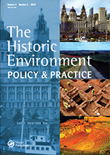
Historic Environment-Policy & Practice
Advancing the Preservation of Our Shared Past.Historic Environment-Policy & Practice is an esteemed journal that serves as a vital platform for interdisciplinary discourse within the fields of archaeology, conservation, and history. Published by Routledge Journals, Taylor & Francis Ltd, this journal enjoys notable recognition, characterized by its Q1 rankings in 2023 across all relevant categories. This esteemed status positions it among the top tier of publications, with Scopus rankings reflecting its impact, such as a remarkable 98th percentile in Arts and Humanities - History. Aimed at researchers, professionals, and students, the journal publishes insightful articles that connect policy with practical applications in the historic environment. With its dedicated focus on promoting the understanding and sustainability of cultural heritage, Historic Environment-Policy & Practice is a crucial resource for anyone involved in the preservation and study of our collective past. No open access is available, but the journal ensures high-quality peer-reviewed content showcasing the latest research and practices in the field.
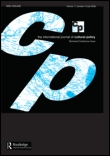
International Journal of Cultural Policy
Illuminating the Path of Cultural Policy ResearchThe International Journal of Cultural Policy, published by Routledge Journals, Taylor & Francis Ltd, is a prestigious platform dedicated to advancing scholarship in the fields of cultural studies and sociology, establishing itself as a leading resource for researchers, professionals, and students engaged in exploring the intersection of culture, policy, and society. Since its inception in 1997, the journal has consistently achieved high-impact standings, currently classified in the Q1 category for both Cultural Studies and Sociology and Political Science, making it essential reading for those interested in the nuances of cultural governance and policy-making. With a remarkable Scopus rank placing it in the top percentile of related journals, it facilitates the dissemination of innovative research that tackles contemporary cultural challenges. While the journal is not open access, it remains an invaluable resource, offering a rich archive of theoretical and empirical studies critical for understanding the dynamic interplay of culture and policy across varied contexts. We highly recommend it for those seeking to enhance their knowledge and contribution to this vibrant field of study.
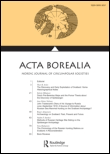
Acta Borealia
Unveiling Cultural Narratives of the Boreal RegionsActa Borealia is a prestigious academic journal published by ROUTLEDGE JOURNALS, TAYLOR & FRANCIS LTD, based in the United Kingdom. Since its inception in 1984, the journal has established itself as a vital platform for scholarly discourse in the fields of Anthropology, Cultural Studies, History, Sociology, and Political Science. With a commendable impact factor and placement in Q1 and Q2 quartiles across various categories, it demonstrates a strong commitment to high-quality research and innovative contributions. The journal is well-ranked in Scopus metrics, highlighting its influence and reach within the arts and humanities as well as social sciences. Acta Borealia publishes original research articles, reviews, and critical essays, making it an essential resource for researchers, professionals, and students alike seeking to enhance their understanding of northern studies and related fields. While securing access may require institutional login or subscription, the journal's rich content continues to foster interdisciplinary discussions that are critical for navigating complex social issues.

ANTHROPOS
Advancing scholarship in the heart of cultural exploration.ANTHROPOS is a distinguished journal published by NOMOS VERLAGSGESELLSCHAFT MBH & CO KG, anchoring its academic presence in Switzerland since its inception in 1983. With a commitment to advancing the fields of Anthropology and Arts and Humanities, this peer-reviewed publication serves as a vital platform for scholarly research, providing critical insights and fostering dialogue among researchers, professionals, and students alike. ANTHROPOS is categorized in Q3 for both Anthropology and the broader Arts and Humanities domains as of 2023, indicating its reputable yet emerging presence within these disciplines. Despite its significant contributions, the journal currently does not feature open access options, urging readers to engage through traditional academic channels. By embracing interdisciplinary approaches and contemporary issues, ANTHROPOS aims to illuminate complex cultural phenomena, making it an essential resource for anyone dedicated to understanding the intricacies of human societies.
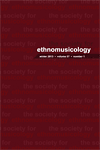
ETHNOMUSICOLOGY
Illuminating the Rhythms of Human ExperienceETHNOMUSICOLOGY, published by SOC ETHNOMUSICOLOGY INC, is a premier journal that stands at the intersection of music, anthropology, and cultural studies. With an ISSN of 0014-1836 and an E-ISSN of 2156-7417, this journal has made significant contributions to the field since its inception in 2002, and continues to engage with contemporary issues through to 2024. ETHNOMUSICOLOGY is indexed in esteemed databases and ranks impressively in its respective categories, including Q2 in Cultural Studies and Music, and Q3 in Anthropology for the year 2023. Its Scopus rankings reflect its robust academic impact, placing it in the 79th percentile for Music within the Arts and Humanities, and 78th in Cultural Studies. The journal provides a vital platform for the dissemination of innovative research and fosters scholarly dialogue among researchers, professionals, and students interested in understanding the complex relationships between music and culture across the globe.

Studia Ethnologica Croatica
Exploring the Depths of Croatian CultureStudia Ethnologica Croatica is a distinguished open-access journal dedicated to the fields of ethnology and cultural anthropology, published by the University of Zagreb's Faculty of Humanities and Social Sciences. Since its inception in 1989, the journal has provided a platform for scholarly discourse and critical analysis of cultural practices, social structures, and ethnographic research pertinent to Croatia and beyond. With an impressive Q2 ranking in Cultural Studies and a strengthening presence in Anthropology (Q3), the journal is essential for researchers and practitioners alike, contributing significantly to ongoing discussions within these disciplines. Recognized on Scopus with notable rankings, it represents a valuable resource for those seeking to deepen their understanding of contemporary ethnological issues. The journal operates under an open access model, ensuring that its high-quality research is freely accessible to a global audience, thereby fostering collaboration and inspiring new inquiries within the social sciences.
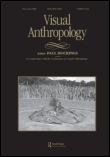
Visual Anthropology
Decoding Society Through Visual NarrativesVisual Anthropology is a distinguished journal published by Routledge Journals, Taylor & Francis Ltd in the United Kingdom. With an ISSN of 0894-9468 and E-ISSN 1545-5920, this journal focuses on the intersection of visual media and anthropological research, exploring the ways in which visual representations influence cultural practices and perceptions. Since its inception in 1987, Visual Anthropology has contributed significantly to the fields of Anthropology and Cultural Studies, earning a Q2 rank in both categories as of 2023. With a solid impact factor and strategic indexing, the journal maintains a vital place for scholars seeking to understand the visual dimensions of human behavior and societal structures. Although it operates under a traditional subscription model, its rigorous peer-review process ensures the dissemination of high-quality research. The journal invites researchers, professionals, and students alike to engage with cutting-edge studies that bridge visual culture and anthropological inquiry.